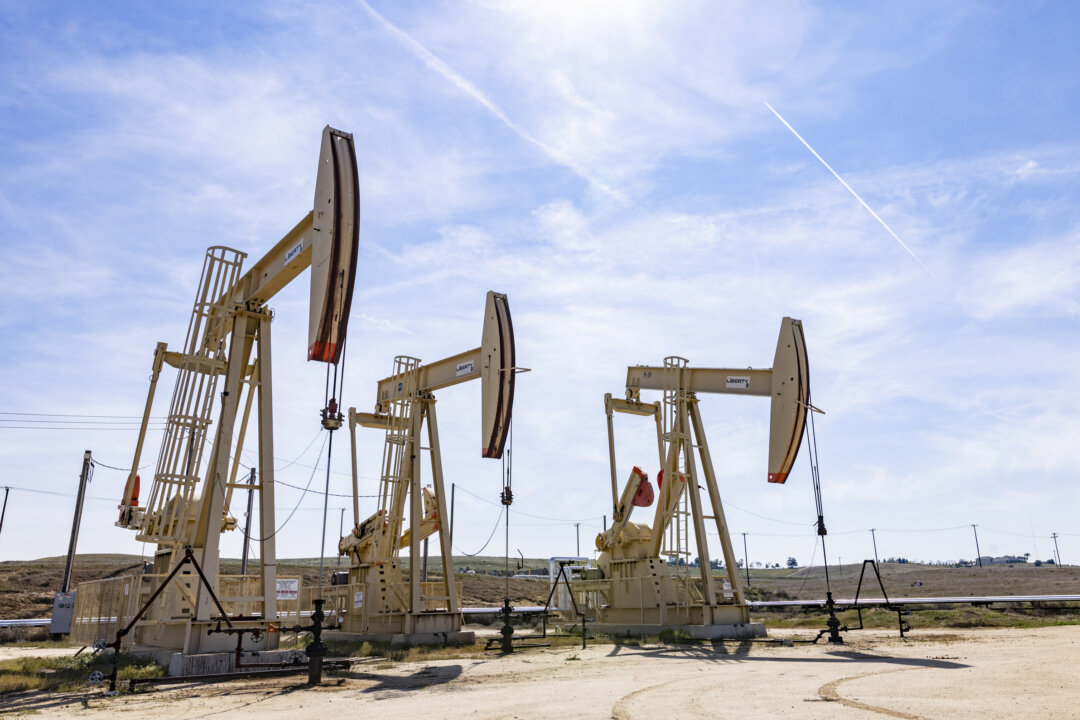Prices could rise from $4.82 to as high as $8.44 a gallon on average, said the report.
California gas prices could skyrocket by as much as 75 percent by the end of 2026 with the expected shutdown of oil refineries in the state, according to an analysis released May 5 by a researcher at the University of Southern California (USC).
Regular gasoline prices could rise from an average of $4.82 in April 2025 to as high as $8.44 a gallon by the end of next year, said the report, authored by Professor Michael Mische at the Marshall School of Business.
Two Phillips 66 refineries in Los Angeles—about 8 percent of the state’s oil refining capacity—are slated to close by the end of this year. Valero Energy Corp. also announced last month it will shut down or restructure its Benicia refinery in the San Francisco Bay area—which accounts for about 9 percent of refining capacity—by April 2026, increasing concerns over gas prices and supply.
The USC analysis states that based on current demand, consumption, state regulations, and other factors, the refinery closures could result in a potential 21 percent drop in refining capacity from 2023 to April 2026.
This could create a gasoline deficit potentially ranging from 6.6 million to 13.1 million gallons a day, said Mische.
“Reductions in fuel supplies of this magnitude will resonate throughout multiple supply chains affecting production, costs, and prices across many industries such as air travel, food delivery, agricultural production, manufacturing, electrical power generation, distribution, groceries, and healthcare,” he wrote.
Industry experts have also warned that gas prices will spike dramatically when the refineries close.
Phillips 66 said it was shutting down its LA refinery because of the uncertainty surrounding its long-term sustainability, and because of “market dynamics.”
The state of California is currently suing major oil companies over alleged deception regarding the risks of climate change and fossil fuel combustion.
Governor Urges Energy Commission to Take Action
In an April 21 letter, Gov. Gavin Newsom directed California Energy Commission (CEC) vice chair Siva Gunda to “redouble” the state’s efforts to work closely with oil companies to ensure a “safe, affordable, and reliable supply of transportation fuels, and that that refiners continue to see the value in serving the California market, even as demand for fossil fuels continues its gradual decline over the coming decades.”
Newsom directed Gunda “to reinforce” the state’s “openness to a collaborative relationship and our firm belief that Californians can be protected from price spikes and refiners can profitably operate in California—a market where demand for gasoline will still exist for years to come.”
The governor also referred to the CEC’s Transportation Fuels Assessment report, which lists a state takeover of oil refineries in California as one of several options, and directed Gunda to recommend “any changes in the state’s approach that are needed” by July 1.
Republican state Sen. Brian Jones from San Diego, the Senate minority leader, issued a May 6 statement citing the USC study and calling the refinery closures “a looming energy and economic crisis.”
“If the Governor doesn’t act now, Californians will be blindsided by sticker shock at the pump and skyrocketing prices on everyday goods,” Jones said.
In a May 6 letter to Newsom, Jones called for urgent measures to prevent further refinery closures and support long-term energy stability, such as investment tax credits or other relief from taxes and regulations.
Meanwhile, Republican state Sen. Shannon Grove from Bakersfield urged the governor to increase new drilling permits to support in-state oil production instead of relying on “expensive foreign imports, often from hostile nations,” she told The Epoch Times.
New permits have plummeted 97 percent over the last five years, according to data from the California Department of Conservation. New drilling permits in the state dropped from 2,676 in 2019 to 86 in 2024.
“This is catastrophic for every Californian at the gas pump,” Grove said in an April 16 social media post. “Refineries are shutting down or barely hanging on because they can’t get the oil they need to produce the gas used every day by California families.”
‘Controlling the Damage’
Mike Umbro, founder and CEO of Californians for Energy and Science—a nonprofit advocate for energy economics and environment—and a developer of an oil field project west of Bakersfield, told The Epoch Times that Newsom’s letter appears to be conducting damage control with oil companies.
“He is trying to task Siva Gunda with controlling the damage,” Umbro said.
Umbro urged the governor to take a more direct and deliberate approach by signing an executive order declaring an energy crisis, issuing permits to drill, and allowing refineries to produce gasoline.
He applauded the USC study, saying it and other independent studies are what’s needed to fully evaluate the oil-and-gas supply and ensure there is no shortage of affordable gas at the pumps for consumers.
Daniel Villaseñor, a spokesman for the governor’s office, told The Epoch Times in response to questions that Newsom’s letter to Gunda “speaks for itself.”
Sandy Louey, a CEC spokeswoman, told The Epoch Times in an email that the agency is “committed to working with stakeholders to explore options to ensure an affordable, reliable, and safe transportation fuel supply.”
Louey said the concept of a state-owned refinery is “just one in a list of many potential options for the state to consider” that the CEC proposed as possible solutions to mitigate gas price spikes in a report released last August.
In the report, the CEC identified that a state-owned refinery may provide relief to consumers but recognized many challenges to overcome, including high costs, the expertise necessary to manage refinery operations, and how the refinery would fit into the state’s transition away from petroleum fuels, she said in the email.
The California Air Resources Board is also required to develop and submit a Transportation Fuels Transition Plan to be released by the end of the year, Louey said.
According to a statement by Valero, a fire broke out at its Benicia refinery on May 5 but was extinguished within hours.
No injuries were reported, and the cause of the fire is under investigation, said the oil company. Valero did not say whether the fire would significantly disrupt production at the refinery.










Leave feedback about this